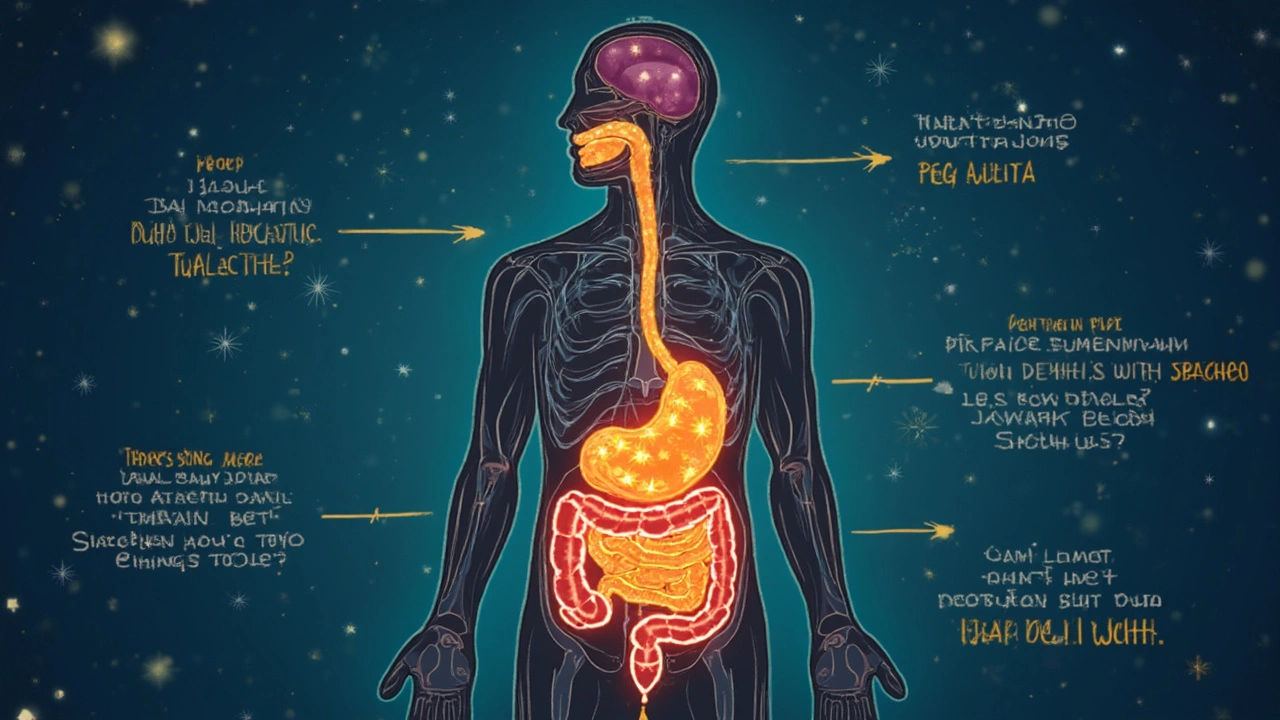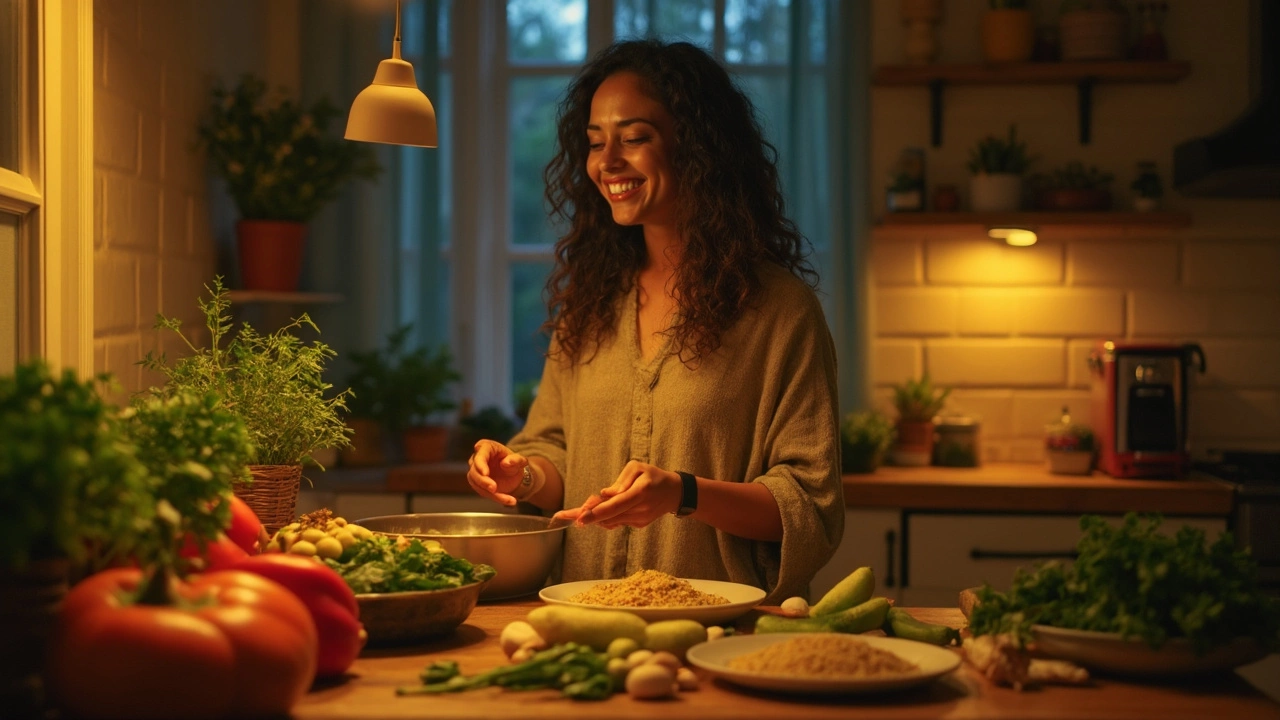Why You Should Think Twice Before Having Dal at Night
 May, 13 2025
May, 13 2025
Ever felt bloated or heavy after a late dinner starring that comforting bowl of dal? You’re not imagining things. For a lot of people, eating dal late does more harm than good. Dal is packed with protein and fiber, but your gut isn’t as strong at night as it is during the day. That means digesting complex foods, especially lentils and pulses, gets harder as your body winds down.
What most folks don’t realize is, dal can be a sneaky culprit behind that gurgling stomach or restless night. The reason is simple: the fiber and certain carbs in dal take more time to break down. At night, your metabolism is sluggish. Instead of giving you energy, dal can lead to discomfort, gas, and even a disrupted sleep cycle.
- What Makes Dal Hard to Digest at Night
- Gassy After Dinner? Here’s Why
- Simple Dal Swaps for Dinner
- Better Dinner Choices for Restful Sleep
- Tips for Enjoying Dal Without Trouble
What Makes Dal Hard to Digest at Night
Your stomach isn’t working at full speed by the time the sun sets. At night, your whole digestive system slows down—this is just how the body gets ready for rest. Now, when you load it up with dal, which is rich in both protein and fiber, it suddenly has more work to do right when it would rather chill out.
The main issue is the types of carbs and fibers found in most dals. These can be tough to break down, especially the oligosaccharides—a scientific word for the hard-to-digest stuff that sits in your belly and ferments. This is what causes uncomfortable gas and bloating if you eat dal too late.
Another thing: the proteins in dal take longer to digest compared to simple carbs like rice. At night, the amount of acid and digestive juices your body produces goes down, so dal just lingers around in your gut. That’s a recipe for heaviness, late-night heartburn, or even disturbed sleep.
Here’s a table that breaks down common types of dal, showing their fiber and protein content per cooked cup:
| Dal Type | Protein (g) | Fiber (g) |
|---|---|---|
| Toor Dal | 11 | 8 |
| Moong Dal | 13 | 15 |
| Chana Dal | 12 | 12 |
| Masoor Dal | 9 | 8 |
So, eating dal at night gives your body more than it can handle before sleep. If you still love your dal, try to eat it for lunch or a light evening meal, not right before you crash. And if you must have it, go for smaller portions with less ghee or oil. Your belly will thank you.
Remember, when it comes to dal at night, timing really does matter for comfortable digestion.
Gassy After Dinner? Here’s Why
Let’s be real—there’s nothing fun about feeling bloated or gassy after eating, especially when trying to unwind for the night. Dal does a great job giving you energy and keeping you full, but late at night, it’s also one of the top foods that leave you uncomfortable. The main trouble comes from certain carbs inside dal, called oligosaccharides. Your stomach can’t break these down on its own, so gut bacteria step in. That’s what creates gas.
Now, during the day, this isn’t usually a big deal because your body’s working at full speed. But as you get closer to bedtime, your digestion slows. That means these tricky carbs hang around in your gut for longer, which just builds up more gas and that heavy feeling.
Some folks think everyone digests dal the same way, but here’s a surprise—not all pulses are created equal. For example, moong dal is a bit easier on the stomach, while chana dal or rajma (kidney beans) contain higher fiber and more of those tough carbs, making things worse after dark.
| Dal Type | Gassy Potential | Fiber Content (per 100g cooked) |
|---|---|---|
| Moong Dal | Low | 1.8g |
| Masoor Dal | Moderate | 2.5g |
| Chana Dal | High | 7.6g |
| Rajma | Very High | 6.4g |
One more thing: having dal as your main dinner dish often means you’re combining it with rice, roti, or other sides, which adds even more carbs to the meal. That’s a lot for your gut to handle just before sleep. People with sensitive stomachs or those dealing with IBS might find this hit even harder.
- If you often feel gassy after a dal at night, try eating a lighter portion or switch to lunch instead.
- Pair your dal with ginger or cumin (jeera) in tempering—both help cut down gas production.
- Soaking dal well and cooking it thoroughly also reduces those hard-to-digest carbs.
This isn’t some weird food myth—it’s all about simple body science. So, watch what goes into your dinner bowl next time you’re tempted by a big helping of dal.

Simple Dal Swaps for Dinner
If you've gotten used to ending your day with a big bowl of dal, it might be time to shake things up. There are plenty of lighter, easier-to-digest options that work better for dinner—especially when good sleep and a happy gut are on your mind.
If you still crave something hearty, reach for moong dal instead of chana or urad dal. Moong dal is softer on your stomach and digests a lot faster. This simple change means you can still get that comfort without the heaviness or next-day regret. According to a small Indian nutrition survey in 2023, switching to moong dal at night cut down bloating and discomfort in over 60% of people.
- Swap regular dal for a small bowl of homemade vegetable soup. Toss in peas, carrots, and spinach, and you’ll get nutrients minus the gut struggle.
- Try clear chicken soup or light paneer bhurji. Both are easy proteins and won’t keep you up later.
- If you’re stuck on lentils, go for a thin, watery moong dal khichdi with more veggies than rice or dal. This keeps things light on your stomach.
- Steamed veggies with a dash of salt and pepper is a quick, no-hassle alternative too.
Let’s compare common Indian dinner items side-by-side for how easy they are on your gut and how likely they are to mess with your sleep:
| Food | Digestion Time (Hours) | Chances of Night Discomfort |
|---|---|---|
| Moong Dal (watery) | 2-3 | Low |
| Chana Dal | 4-5 | High |
| Chicken Soup | 1-2 | Low |
| Vegetable Soup | 1-2 | Very Low |
| Paneer Bhurji | 2-3 | Low |
The key here? Don’t go crazy with heavy greasy stuff at night. Keep portions small and aim for easy-to-digest meals. This simple routine switch can do wonders—especially if dal at night is always getting you into trouble.
Better Dinner Choices for Restful Sleep
If you’re finding it tough to sleep well after eating dal at night, there are smarter dinner swaps that can actually help you sleep better. Here’s the deal—your body wants light, easy-to-digest foods once it starts winding down for the day. Go for dishes that are gentle on the stomach but still filling enough, so you won’t feel hungry at midnight.
Experts from sleep research centers in India have seen that heavy meals or foods rich in fiber and complex carbs (like dal) can keep your stomach busy for hours. This can disturb your sleep cycle. Ideally, your dinner should give your gut a break and help your body relax for the night.
- Try soft, well-cooked rice with plain curd. Yogurt has probiotics that can calm your gut and rice digests quickly.
- Khichdi made with more rice and less dal works well. It’s light and soothing—great for keeping things simple at night.
- Steamed or sautéed veggies like bottle gourd, carrots, or pumpkin are gentle on your tummy. Pair them with a little ghee for added comfort.
- Upma or poha can be a good call. These are low in fat and move through the stomach easily, especially when you don’t crowd them with spicy chutneys or fried toppings.
If you can’t let go of dal at night, stick to moong dal. It’s the easiest variety to break down, but remember to use less oil and spices. Also, aim to finish dinner 2-3 hours before bed. This gives your body enough time to settle before you hit the pillow. Your gut—and your sleep—will thank you.

Tips for Enjoying Dal Without Trouble
Missing your evening dal but worried about those side effects? You don’t have to give it up completely. There are practical ways to make dal lighter on your stomach, even if you don’t want to say goodbye to your homestyle favorite. Here’s what actually helps:
- Soak your dal: Always soak dal for at least 2-4 hours before cooking. This simple step breaks down some of the hard-to-digest bits, making it much easier for your gut to handle. Skipping the soak increases the chance of gas and bloating.
- Cook it really well: The softer the dal, the easier it is to digest. Use a pressure cooker or slow cooker if possible. Undercooked dal is a recipe for discomfort, especially at night.
- Add digestive spices: Common Indian spices like cumin (jeera), asafoetida (hing), ginger, and black pepper are not there just for taste. They actively help reduce gas and improve digestion. Toss a bit of these into your dal, especially for dinner.
- Keep portions small: Large servings of dal at night can overwhelm your slowed-down metabolism. Try keeping your serving to half a bowl if your stomach is sensitive in the evening.
- Pair wisely: Skip heavy, oily sides at night. Dal with plain rice, a light phulka, or even just by itself is easier on the system. Avoid pairing with fried foods or fatty curries in the same meal.
If you want a bird’s-eye view of what really makes a difference, check out this quick table:
| Tip | Why It Works |
|---|---|
| Soak Dal | Reduces antinutrients and helps break down tough fibers |
| Cook Thoroughly | Makes proteins and fibers easier to digest |
| Add Spices | Spices like hing lower gas and boost gut health |
| Small Servings | Keeps your digestive load manageable at night |
| Simple Pairing | Avoids overloading your stomach with fats and carbs |
One important thing—if you’re serious about improving your night routine, don’t just focus on one hack. Combine these tips for real results. That way, you can still enjoy your dal at night without paying the price in gut trouble or restless sleep. It’s all about smart choices and habits, not just what’s in your bowl.